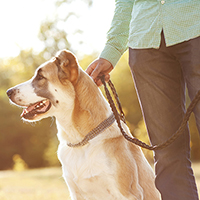If you have a dog, you have one of the best gifts life has to offer. And when those big beautiful look up at you adoringly, you are super motivated to provide the absolute best life your dog can possibly have. Here are 7 answers to frequently asked questions about caring for dogs that will help you and your dog enjoy a long and happy life together.
1. How often do we need to visit the vet? Regularly scheduled appointments for adult dogs are scheduled annually. These visits give shots that prevent Bordetella, Leptospirosis, Parvo, Rabies, and Lyme Disease among others. The veterinarian also does a general check of eyes, ears, heart, teeth, and coat to make sure that there are no indications of underlying problems.
This yearly visit is also a chance for you speak with your vet about any concerns or behaviors and get professional advice that can help. And while it is an exam for your dog, it's a great learning experience for how the canine body works and what it needs to stay healthy.
2. If an emergency situation arises after hours, what should we do? Fortunately there are many wonderful emergency vets that are only open after hours for just such emergencies. Often the message you receive when calling your vet after hours will give the name, location, and phone number of nearby emergency vets. But don't wait until you need one to ask.
Get the name, phone, and location for the emergency vet from your regular veterinarian and post it on your desk (or my personal favorite) the refrigerator. Then when you need it you can find it quickly.
3. What kind and how much food is best? This will depend on the breed of dog you have selected. If your dog is healthy and does not have dietary or health issues, feed a high quality food that is low on preservatives and fillers.
Be careful about portions. If your dog is a working dog on a farm, on one that retrieves or hunts with you on a regular basis, it may need the amount called for on the package. But if your dog is more of a companion dog feed a smaller portion of the manufactured food and augment the daily diet with fresh vegetables, lean meat, pasta, and cheese.
Avoid chocolates, foods high in caffeine, salt and sugar. These can cause acute and long-term problems, and even death. If you have questions about food because your dog is either obese or not thriving, consult your veterinarian immediately.
4. What frequency of bathing is best? How often you give your pooch a bath depends on the kind of dog and its lifestyle. If your friend spends a lot of time outside and rolls in things it shouldn't, baths will probably need to be more frequent. If your companion is a lap dog, fewer baths will suffice.
However, if you dog has skin problems, bathing can be one of the best ways to rid the skin of bacteria that can cause problems. Ask your vet to recommend a canine shampoo, and let the vet determine the frequency of baths before you bathe any dog regardless of the breed. Bathing too often and with the wrong shampoo can cause problems and discomfort for your dog.
5. Do we need to give heart worm pills in the winter? Yes, heart worm pills should be given once a month every month regardless of weather or location.
6. Should we continue to apply flea and tick prevention in the winter? Yes, precaution against fleas and ticks should be given monthly. Be sure to buy what your vet recommends. A friend tried to save a few dollars on an off-brand. Her dog had an allergic reaction to it, and instead of saving money, she paid a $200 vet bill.
Of course the dog was miserable too because he had to wear a cone around its head. An ounce of prevention really is cheaper than a pound of cure.
7. My dog sheds. Is there anything I can do about it? You can brush your dog frequently to get rid of the fur before it mats and to decrease the amount in your home. Bathing may help get rid of fur that is lose.
But check with your vet before beginning a bathing regime. Using an air purifier designed to remove airborne hair and dander will cut down on the amount in your home and in your lungs.

 Dangerous - Home Dog Care Remedies to Avoid!
Dangerous - Home Dog Care Remedies to Avoid!
Dangerous - Home Dog Care Remedies to Avoid!
Dangerous - Home Dog Care Remedies to Avoid!
 How to Gently Put Down a Dog
How to Gently Put Down a Dog
How to Ge
How to Gently Put Down a Dog
How to Gently Put Down a Dog
How to Ge
 How to Groom a Dog
Good grooming will help your dog lo
How to Groom a Dog
Good grooming will help your dog lo
 What is a responsible dog breeder?
Imagine yourself as an average pers
What is a responsible dog breeder?
Imagine yourself as an average pers
 Keep Your Dog Safe in the Summer Heat
Keep Your Dog Safe in the Summer Heat
Keep Your Dog Safe in the Summer Heat
Keep Your Dog Safe in the Summer Heat